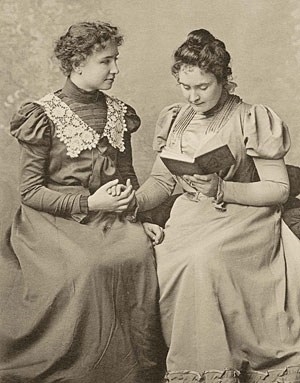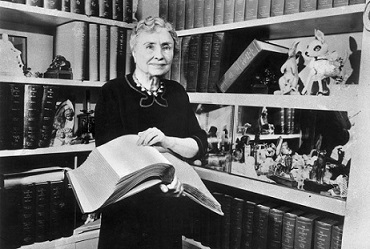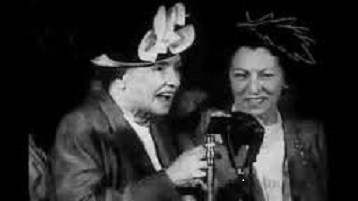 |
| Anne Sullivan read to Helen Keller (http://harvardmagazine.com/2004/07/helen-keller.ht ()) |
"A blind and deaf little girl came up out of Egypt and stood before Sinai, could hear a powerful voice inside her saying, 'Knowledge is love and light and vision'" (Keller). No one would have ever thought a girl with several disabilities could overcome all the obstructions on her way to success and become a well-known author, political activist, and lecturer. Her name is Helen Adams Keller. She was born in Tuscumbia, Alabama on June 27, 1880. When Keller was 19 months, she had a serious illness which caused her to lose the ability to hear, speak, and see. At the age of seven, Anne Sullivan became her teacher who acted as the light in Helen's life which helped her to realize her potential. With this strong companion, Keller attended Wright-Humason School for the Deaf in New York City, Cambridge School for Young Ladies, and Radcliffe. In her later years, she spent most of her time raising funds for the American Foundation for the Blind. Keller chose to face all the difficulties she met by using her hands as tools. With curiosity, Keller transcended the own handicaps that bounded her freedom; with courage, Keller bravely faced difficult situations; with determination, Keller displayed the potential that all humans have.
 |
| Helen Keller in the library (http://www.goodhousekeeping.com/life/inspirational ()) |
Helen Keller's eagerness towards knowledge built up her path to success. Because of the disabilities, Helen's acts were always full of madness and extremes. Arthur and Kate Keller, her parents, finally met Anne Sullivan, in order to let Keller learn how to restrain her behaviors. "From that time forward, Keller's curiosity was insatiable and Sullivan's patient perseverance unflagging. Little by little, Keller learned to express herself through the manual alphabet and to read Braille" ( "Helen Keller."). Since Helen Keller could not see nor hear, she learnt speaking by touching Sullivan's lips and throat. It was common for her to learn a single word for several days. However, her curiosity helped her persist in learning more about the world. Her caprice and energy changed into the desires to learn. Under Sullivan's help, Keller started to know more about the society and had a larger social circle. As she became older, Keller first met Mark Twain, a famous author. "Without touching anything, and without seeing anything, obviously, and without hearing anything, she seemed to quite well recognize the character of her surroundings. She said, 'Oh, the books, the books, so many, many books. How lovely!'" (Carlson). Their meeting was a gift for Helen Keller, and Mark Twain was also surprised with this deaf and blind girl. Helen's tireless curiosity triggered Twain to consider his attitude towards books and knowledge. Helen Keller's great effort was finally affirmed when she got the admission from Radcliffe. In her book The Story of My Life, which was written at her age of 21, she stated: "Knowledge is happiness, because to have knowledge-broad, deep knowledge- is to know true ends from false, and lofty things from low" (Keller 74). Though Keller attended Radcliffe, she did not feel arrogant because she knew that everyone has their own virtue that she could learn from. Helen Keller's opportunities were important for her to success, but the curiosity helped her to pave the way to meet those opportunities.
When she faced difficulties and hardships, Helen Keller showed her bravery and courage. According to the letter written by Helen Keller at the age of nine to John Greenleaf Whittier, she said: "It is very pleasant to live here in our beautiful world. I cannot see the lovely things with my eyes, but my mind can see them all, and so I am joyful all the day long" (Ozick). In the early age, Keller did not treat the disability as the difference from other people, she faced the world positively. She didn't choose to abandon her goals because of the congenital defects; instead, her behaviors told that the best thing for her was to be born. Keller was stimulated to work hard by the saying "To be banished from Rome is but to live outside of Rome"during her years struggling for college. "Debarred from the great highways of knowledge, she was compelled to make the journey across country by unfrequented roads" (Keller 68). Helen Keller showed her strength and braveness during her long road to success. She would rather try for as many times as she could than give up to avoid being hurt. The reason Helen Keller could get past the obstacles was due to her braveness.
 |
| Helen Keller was giving a speech (https://www.youtube.com/watch?v=ARdSEljce6Y ()) |
Through her determination, Keller developed into an extraordinary person. Helen Keller was not only famous as the first deaf and blind person who graduated from college with honors, but she also took part in some social activities. By publishing her book, "Keller had discovered that she could write effectively and she pursued that calling, undaunted by an early incident in which her powerful memory entangled her in involuntary plagiarism" (Shattuck ). The saying "God closes one door while opening another one for you" fits Helen Keller perfectly. Though the hearing and seeing defects made her life bounded her freedom, Helen Keller still had a huge effect on the society by using the senses of touching and speaking. Under the guidance of Anne Sullivan and her friends, Keller became a lecturer who influenced more people to change their attitudes towards the vulnerable groups society looked down upon. Her biography narrates that in her later years, Keller devoted the rest of her life to the promotion of social reforms aimed at bettering the education and treatment of the blind, the deaf, the mute, and, in effect, all handicapped individuals...... Her efforts were also very influential in putting an end to the practice of committing the deaf and the blind to mental asylums ("Helen Keller"). Helen Keller stuck to her will to help more people with disabilities because she sympathized and felt unrelentless compassion towards those in a similar situation to hers. Despite mental inabilities, she believed they could live an easier life. Helen Keller's determination in helping others and strengthening herself made her a special person with identity.
Helen Keller used her life to interpret that everyone has the opportunity to achieve the goal. She proved herself in 1955; " Harvard acknowledged her with its first honorary degree ever granted to a woman. The citation for the new doctor of laws stated, 'From a still, dark world she has brought us light and sound; our lives are richer for her faith and her example'" (Shattuck ). People who lived around Keller could feel her passion and energy towards life. Though Helen Keller was blind and deaf, she saw things which sighted people miss, heard things that who can hear don't. Her life was not plain nor bored. Keller became the first deaf and blind student to earn a Bachelor of Arts degree in Radcliffe in 1904 (Carlson). As a deaf and blind student, Helen Keller did what normal people can't. Her disability had never trapped her; instead, they helped her to become more sensitive in the sense of touching. No matter how people deny or query her efforts, Keller always ignored them and chose to do what she thought is important for herself. Helen Keller is an inspiration because she cared about others and believed in herself firmly. Helen Keller's life may have less color and sounds than normal people, but knowledge and braveness filled her life with more satisfaction and joy.
Carlson, Peter. "Helen Keller touches Mark Twain's heart." American History 47.4 (2012): 16+.Biography in Context. Web. 2 May 2016.
Ozick, Cynthia. "What Helen Keller Saw." Gale Student Resources in Context. Detroit: Gale, 2007. Student Resources in Context. Web. 2 May 2016.
"Helen Keller." Contemporary Heroes and Heroines. Vol. 1. Detroit: Gale, 1990. Biography in Context. Web. 27 Apr. 2016
Keller, Helen Adams. The Story of My Life. New York: Bantam, 1990. Print.
Shattuck, Roger. "Helen Keller." Harvard Magazine. Harvard Magazine, 01 July 2004. Web. 02 May 2016. <http://harvardmagazine.com/2004/07/helen-keller.html>Page created on 5/19/2016 12:00:00 AM
Last edited 5/19/2016 12:00:00 AM
